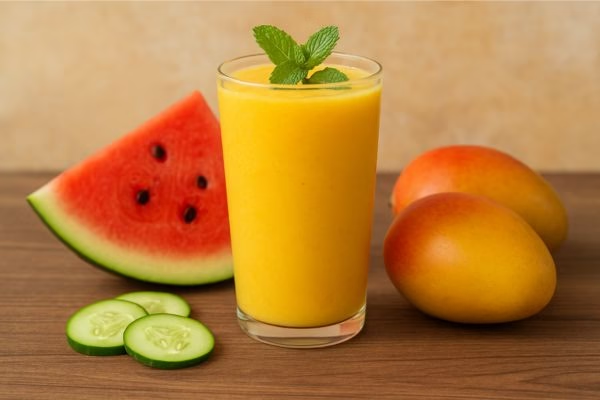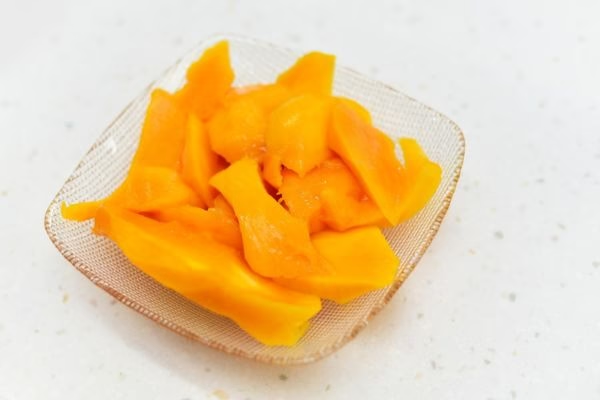Summer isn’t just about sunshine and vacations—it’s also the perfect time to enjoy juicy, sun-ripened mangoes. Often crowned the “king of fruits,” mangoes do more than please your palate. They’re packed with essential nutrients that help your body thrive in the heat.
From keeping you cool and hydrated to boosting your immunity and skin glow, this tropical fruit is a summer powerhouse. In this post, we’ll explore how eating mangoes impacts your health and share some smart tips for enjoying them mindfully.

1.Beat the Heat: Stay Hydrated and Balanced
During summer, your body loses more fluids and minerals due to sweat, which can lead to fatigue, cramps, and dehydration.
How Mangoes Help
- Mangoes are about 80% water, making them naturally hydrating.
- They contain potassium and magnesium—two key electrolytes lost through sweat.
- Natural sugars in mangoes offer a quick energy lift without relying on caffeine or soda.

Pro Tip
Blend mangoes with water-rich fruits like watermelon or cucumber for a revitalizing smoothie that cools and hydrates at once.
2.Boost Your Immunity Naturally
Exposure to heat, allergens, and seasonal bacteria can challenge your immune system in the summer.
Why Mangoes Are a Smart Choice:
- Rich in vitamin C, mangoes help ramp up white blood cell production to fight infections.
- They’re also high in beta-carotene, which your body converts into vitamin A—a nutrient that protects your respiratory system and mucous membranes.

Wellness Tip
Eating mangoes regularly (but not excessively) may help reduce your chances of summer colds, sore throats, and heat-related fatigue.
3.Improve Digestion in Hot Weather
The heat can make digestion sluggish, leaving you feeling bloated and heavy after meals.
How Mangoes Support Gut Health:
- Mangoes are rich in digestive enzymes like amylases, which help break down carbs more efficiently.
- The dietary fiber in mangoes supports bowel regularity and relieves constipation.
- Their soothing properties can calm minor digestive discomfort caused by rich or spicy foods.

Try This
A few mango slices after lunch can aid digestion and give you a gentle energy kick—just keep your portion size in check.
4.Fuel Your Day with Natural Energy
Hot days can drain your stamina, leaving you feeling sluggish and unmotivated.
Why Mangoes Make a Great Pick-Me-Up:
- Their natural sugars (glucose and fructose) give you a quick, clean energy lift.
- Mangoes contain vitamin B6, which helps your body convert food into energy efficiently.
- Ideal for a pre-workout snack or a light afternoon recharge.

Quick Tip
Keep chilled mango slices on hand for a refreshing, energizing bite between outdoor activities or during a mid-day slump.
5.Nourish Your Skin and Hair from Within
Too much sun exposure can leave your skin dull and your hair dry or brittle. Mangoes help combat that from the inside out.
Beauty Benefits of Mangoes:
- Rich in vitamins A and C, which support collagen production for firmer, clearer skin.
- Antioxidants like zeaxanthin help defend your skin against sun damage and free radicals.
- The nutrients also help strengthen hair follicles and reduce seasonal hair fall.

DIY Tip
Mix mashed mango with plain yogurt and a teaspoon of honey for a cooling, hydrating summer face mask.
6.Cool Down Your Body the Natural Way
In Ayurveda, mangoes are considered to have warming properties, but soaking them in water for about 30 minutes helps neutralize this effect.
What Happens When You Soak Mangoes
- It reduces their internal heat (thermogenic effect).
- Prevents common summer problems like heat rashes, indigestion, or nosebleeds.
- Makes the fruit gentler on your stomach, especially for kids or those sensitive to heat.

How to Use
Soak mangoes in a bowl of water before eating to help cool your system and stay balanced.
7.Lift Your Mood and Stay Mentally Sharp
High temperatures can affect your mental clarity, increase stress, and even impact your mood.
Mood-Boosting Benefits of Mangoes
- Mangoes contain tryptophan, an amino acid that helps the brain produce serotonin—the “happy hormone.”
- B vitamins, especially B6, support brain function and help regulate stress.

Mindful Moment
A chilled mango smoothie in the afternoon can serve as both a treat and a brain boost.
8.Protect Your Eyes from Summer Strain
With longer days and increased screen exposure, eye care becomes even more important.
Mangoes for Vision Health
- They’re high in vitamin A, which prevents dryness and supports night vision.
- Contain lutein and zeaxanthin, two antioxidants that help shield your eyes from blue light and sun glare.

Smart Snack
Incorporate mangoes into your breakfast to support your eyes throughout the day.
9.Support Healthy Weight Goals
Many people worry mangoes might be too sugary to fit into a weight-conscious diet—but that’s not the full story.
What You Should Know
- One cup of mango contains around 100 calories, no fat, and no cholesterol.
- The fiber content helps you feel full, which may prevent over-snacking.
- Mangoes are healthier when eaten alone or paired with protein, not as part of heavy desserts.

Pro Tip
Enjoy mangoes as a midday snack or mix them into salads to stay satisfied without going overboard.
10.Eat Mangoes Safely: Smart Guidelines
While mangoes are nutritious and delicious, overconsumption or improper handling can lead to discomfort.
Safety Tips
- Stick to 1–2 mangoes a day depending on size and your sugar needs.
- Avoid eating mangoes right before bed as they can spike blood sugar levels.
- People with diabetes or sugar sensitivities should consult a doctor before regular consumption.
- Choose naturally ripened mangoes—avoid artificially ripened ones, which may contain harmful chemicals like calcium carbide.
Allergy Alert:
Some people may experience mild itching or tingling around the mouth. If it happens, take a break and test with smaller amounts.
Fun & Creative Ways to Enjoy Mangoes
Mango Smoothie: Blend with Greek yogurt or almond milk for a creamy, cooling drink.
Tropical Salad: Mix mango cubes with spinach, avocado, and lime juice for a light lunch.
Mango Sorbet: Freeze pureed ripe mango for a sugar-free frozen dessert.
Green Mango Chutney: Use raw mango with mint and spices for a spicy-sour dip.
Conclusion: A Sweet Way to Stay Healthy This Summer
Mangoes aren’t just a seasonal treat—they’re nature’s way of helping your body thrive in the summer heat. From hydration to digestion, skin to stress relief, this golden fruit is a powerhouse when eaten wisely.
So the next time you bite into a ripe mango, remember: you’re not just enjoying a delicious snack—you’re also fueling your body with vitamins, hydration, and joy
Q1: Can I eat mangoes every day in summer?
Yes, eating 1–2 mangoes daily is safe for most people. Just be mindful of sugar intake and pair with a balanced diet.
Q2: Are mangoes good for kids?
Definitely! Mangoes offer vital nutrients for growing children. Serve in moderation and monitor for any allergic reactions.
Q3: Can I drink water after eating mangoes?
Yes, but it’s best to wait 20–30 minutes to aid digestion and avoid bloating.








